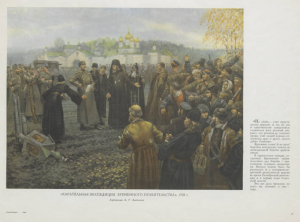Baylor University is a long way from Kirov, Russia and the halls of the University of Oxford in the United Kingdom, but one digital archive unites these seemingly disparate places through the common bond of The Keston Collection.
The Keston Digital Archive currently houses more than 1,800 items related to the subject of religious persecution carried out under Communist regimes. It includes photographs, books, correspondence, petitions and more, with a majority of the items presented untranslated from their original Russian language. These items are drawn from the larger collection housed at the Keston Center for Religion, Politics & Society, a division of the Baylor University Libraries. Currently, all users can access the metadata for all records, with image access available only on-campus or via a virtual scholar request. (Read through to the end of this post to find out how to make a virtual scholar request.)
The Collection’s Early Years
According to its website, the Keston Institute was “founded in 1969 under the title of Centre for the Study of Religion and Communism, [and ]has specialised in the study of all religions and all forms of religious expression in Communist and formerly Communist countries.” The institute’s archive was housed at Oxford until 2007, when it was donated to Baylor and became the centerpiece of the Keston Center.
The Keston Institute bills itself as the “voice of the voiceless,” and focuses its efforts on educating and advocating on behalf of those whose religions are controlled, outlawed or otherwise restricted under Communist regimes. Over the past four decades, the Institute collected thousands of documents and photographs which were included in the donation to Baylor.
Baylor’s Involvement
Since 2007, Baylor has been home to the Keston Center for Religion, Politics & Society, the official archival repository of the Keston archives. The center’s mission is “To promote research and encourage the study of religion in communist, post-communist, and other totalitarian societies and the relationship between religion and Marxism.” Toward that goal, archivist Larisa Seago and director Kathy Hillman are working to digitize, via the Digital Projects Group, materials that can be of use to scholars around the world.
Using a graduate student to scan materials in the Riley Digitization Center and the expertise of Seago (a native Russian speaker) to add metadata and context, the digital archive has grown to include materials of great interest to researchers investigating the impact of state intervention in the private religious lives of its citizens.
Connect with the Collection
To view the metadata for materials available, visit the Keston Digital Archive. Once there, you’ll see examples of materials from categories such as:
Posters

Photographs

Prints

You can also access a selection of Soviet posters found in this collection via our Flickr collection.
For access to materials from locations other than the Baylor University campus, or to make a virtual scholar request, please contact Larisa Seago at Larisa_Seago@baylor.edu.
If you are interested in more information on the Keston Digital Archive, please contact us at digitalcollectionsinfo@baylor.edu. And if you are utilizing its unique resources in your research, we’d love to hear from you. Your work could even be featured in a future blog post!